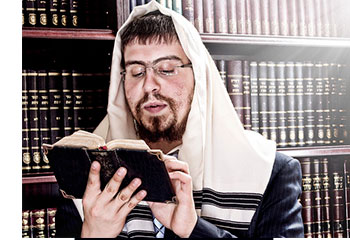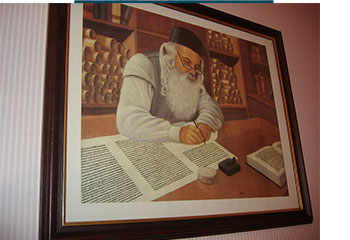My first confrontation with Judaism didn’t go so well. I wasn’t raised in a religious home, though I did go to Jewish day school. I grew up with a strong sense of Jewish identity, understood Hebrew and was familiar enough with Yiddish, thanks to my big Jewish family of Holocaust survivors. But there was no one in my family I could go to for religious answers. When I began having questions about the truth of the Torah and the reality of God, I went to the only source I thought was available: my secular Israeli day school teachers. Let’s just say I found their answers lacking, and leave it at that. So I began looking elsewhere.
My second confrontation with Judaism was when I said goodbye. I had moved to California at the age of 21 and was living in a Buddhist monastery, where I was getting ready to be ordained as a monk. I planned to commit myself entirely to a life of meditation, and that meant leaving many other things behind, including what was left of my connection to Judaism.
I decided I should understand what I was leaving behind, so I bought a few books. In the pages of Everyman’s Talmud, Jewish-British scholar Abraham Cohen’s 1932 summary of the teachings of our great sages, The Thirteen Petalled Rose, Rabbi Adin Steinsaltz’s introduction to Kabbalah, and even, surprisingly, in the ancient words of the Tanakh, I discovered a sophisticated mysticism, a warm humanism, a stern and demanding morality and transcendent poetry.
“There is some value there, after all,” I thought. “Great. I’m glad we can part on good terms.”
• • •
I spent three years in the monastery, two of them as a monk. I loved it. But I still wasn’t sure I wanted to experience life that way for the rest of my existence. I was curious about other paths. So I disrobed and began searching for a non-monastic path with the same intensity and power the monk’s life had provided me.
In due course, I discovered traditional Judaism. Here was a path to sanctify normal life, a pervasive discipline, an all-consuming field of study and purification of heart and deed. Back in my hometown, Winnipeg, I attended a class with a Chabad rabbi who presented an impressive shiur full of spiritual light and crystalline intellectual complexity. I was hooked.

But when I talked to the rabbi about becoming more observant, he raised the issue of my mother, whom he remembered. I was surprised. “Your mother was a convert, wasn’t she?” he asked.
“Yes,” I answered.
“I think she may have been converted by Conservative rabbis,” he continued. “That would mean the conversion is not kosher. You will need to get a gerut l’chumrah” (conversion for the sake of stringency).
The rabbi said it should be a simple thing to arrange. “Why not?” I thought. I wasn’t too worried. Not until a few days later, that is, when the rabbi told me I would have to go to Montreal to live with the Jewish community there for a few weeks, so they could give me instruction and assure themselves of my sincerity. Sure, I was a little put off, but, I thought, if that’s what had to be done, so be it.
I came to the inescapable conclusion that the rabbis could not be trusted to follow the will of God and the intent of the Torah, or even to honestly follow the precedents of rabbinic tradition, without their decisions being tainted by politics
A few days after that, the news got worse. The rabbi had looked further into the situation and now it seemed as though I would need a yearlong period of teaching and supervision before I could undergo the ritual of the gerut l’chumrah.
He suggested that going through a non-hasidic Orthodox rabbi – a local, black-hatted Litvak – might be easier, and arranged for him to take over my case.
That rabbi confirmed it would take a year, but he was confident he could get me my stamp of approval at the end of it. In the meantime, we would study a masterpiece of Jewish philosophy: Rabbi Samson Raphael Hirsch’s Horeb, a philosophical introduction to the meaning of Jewish law. I agreed to his plan.
I continued to immerse myself in Jewish observance and spirituality, studying with a variety of teachers from different movements and denominations. I was convinced that a kind of left-wing modern-Orthodox approach was the most “authentic” engagement with Jewish practice, and I now felt I had to jump through the hoop of getting my Jewish street cred clear, so I could relax and swim with the stream.
I also decided that I should become a rabbi. This seemed like the perfect way for me to be in the world – a life dedicated to study, teaching, community organizing, activism and counselling. I decided I wanted to go to Yeshivat Chovevei Torah (YCT) in New York, where I could join the movement for an intellectually honest, progressive Orthodoxy that grappled truthfully with issues like global justice, homophobia and patriarchy.
By then, I had looked into my mother’s conversion and come to a few conclusions. The first was a clarification of what had happened. My mom had been converted by a council of both Conservative and Orthodox rabbis – something that would be unthinkable today, but did happen in Winnipeg in the 1970s.
The Conservative rabbis involved actually had Orthodox semikhah, but had changed denominations. My parents had an Orthodox wedding, as attested to by a rabbi I found who had been there. As to my mom’s motivations, she gave every indication of authentically wanting to join the Jewish people. She had attended religious classes, learned Hebrew and Yiddish, and had even started bringing my great-grandfather to shul in the morning.

Reviewing all this, the Orthodox rabbis at YCT told me I did not actually need a gerut l’chumrah, but agreed I should get one, if possible, to prevent anyone – like prospective synagogue employers – from casting doubt on my Jewishness.
The rabbi who had mentored me for a year put me in touch with another rabbi at the Toronto beit din (Jewish court of law). I then went through what many prospective converts do: I tried repeatedly to talk to him, while he apparently made no effort whatsoever to accommodate me, and certainly made no effort to welcome me warmly. Perhaps I shouldn’t have been surprised when I got an email from him telling me that even though I had the go-ahead from the ultra-Orthodox mentor I spent a year studying with, whose house I had frequented on Shabbat and who had spent months getting to know my wife and I, the beit din would also need to be assured that my wife planned to be 100 per cent observant by Orthodox standards before they would agree to go through with the ceremony.
By then, I had read extensively about the history of conversion, trying to make sense of the process I was going through and the nature of my mother’s conversion. I knew this impossible request had no basis in traditional, pre-modern Jewish practice, so I responded with a series of questions, quoting several Jewish authorities and asking the rabbi to explain the beit din’s logic, with reference to various classical authorities, whose opinions suggested that my mother and I should be warmly welcomed. I never received an answer.
My wife had promised not to interfere with my observance, but she was not interested in following Orthodox law in every detail. Other rabbis had discussed the situation with us and suggested courses of compromise that we could follow to avoid any violations of Jewish religious law. All of that was now moot. I was flabbergasted.
The rabbis seemed to me to be abandoning the moderate consensus of the past, in favour of imposing stricter standards that would cement their own hyper-stringent definitions of who is Jewish, a critique I found echoed in the writings of Orthodox critics of the mainstream rabbinate, like Marc Shapiro, Avi Weiss and many others.
READ: HAVE SOME JEWISH GROUPS GONE TOO FAR BY TRYING TO SILENCE THEIR OPPONENTS
The idea behind Orthodox Jewish law, as I have come to understand it, is that the contemporary consensus of rabbis determines the will of God. Yet here I saw what my own conscience and intellect declared to be wrongheaded, harmful legal decisions. This was not the only example, of course. I was disturbed by many other decisions the mainstream rabbinate was making with regards to agunot (women unable to receive a religious divorce decree), women’s participation in synagogues, as well as conversion standards, among other pressing issues.
I came to the inescapable conclusion that the rabbis could not be trusted to follow the will of God and the intent of the Torah, or even to honestly follow the precedents of rabbinic tradition, without their decisions being tainted by politics. And from this followed another, more disturbing conclusion: if the rabbis of the present could not be trusted, why should I trust the rabbis of the past, who created the whole framework of Orthodox life?
Within about two months, I had abandoned Orthodox Judaism and any plan to be a rabbi.
• • •
Looking back on that decision, I am not regretful. Actually, although I think I would have enjoyed being a rabbi, and maybe even have been a good one, I don’t think that would have been an intellectually honest and free life for me. Looking back, I am thankful for my expulsion.
After years of continuing intellectual struggle and inquiry, I ended up settling into a spiritual Judaism that feeds on the ethical, philosophical and contemplative fruits of Jewish culture, while keeping a distance from halakhah. I teach at a Yiddishist Jewish cultural centre and lead a Jewish meditation group, where we explore the ethical and contemplative insights of our Jewish heritage and how to apply them in our daily lives together.
What does make me sad, though, is how many Jews (and non-Jews) are negatively impacted by the decisions of the modern-day Orthodox rabbinate – from the oppression of converts, to the embrace of fundamentalism, to the coverup of child abuse. This saddens me because, even though I have no desire to be an Orthodox Jew any longer, I see great value in traditional Judaism.
I also see signs of a grassroots rebellion in Orthodoxy, fed by the twin founts of conscience and the honest, relentless use of the intellect, and I hope that those kinds of Orthodox Jews seize power from the rabbis, whose ethical stances and intellectual arguments fall so woefully short of what they should be. Maybe then, more young Jews with hearts on fire – more Jews like I was, in other words – might again make the old ways shine. I know this much for sure: they will need to find a safe, nourishing home within the yeshivah, and not just in obscure pockets of the Orthodox world, far away from its corridors of power.
